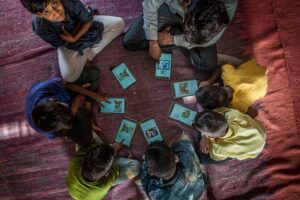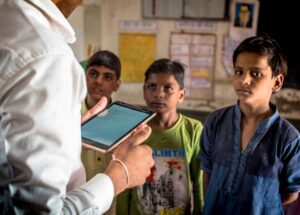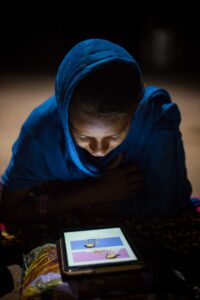Children from Rural India can’t attend schools in the day as they are contributing their energies to livelihood generation activities, or are taking care of their siblings. The state of the future is in the hands of the next generations- our children are at the forefront of every challenge that is to be faced in the coming decades. With more children out of schools, this future looks bleak.
Ancestral knowledge that is practical and hands-on is highly valued by Barefoot College. That’s why our leading global education movement has been considered a success story since its conception 45 years ago. The ineffectual styles of formal education have been recognised as shortcomings that can be remedied to nurture young learners. It is plausible to introduce students to a world of creation, introspective reflection and self-confidence with new tools combined with grass-roots teachings.
Partnered with Worldreader, Barefoot College has been dedicated to reevaluating and implementing newer fashions of education that address both traditional and technological realities. Worldreader is a non-profit corporation based out of California, USA. It was awarded by the STAR Foundation a grant for a project named Read 2 Kids India Program. This program promotes literacy among children through the use of tablets equipped with free libraries of high-quality, locally relevant books and materials. They aim to encourage parents, teachers and caregivers to read to and with children.
Worldreader will enable local teachers, who are taught to use the new technology skilfully, to deliver non-formal English literacy efficiently. This in turn also exposes the teachers, who come from the same surrounding villages, to the same digital technology. Uniquely, the classes are structured around a storytelling fashion that is more interactive and has shown success in boosting communication skills for the children, among other notable benefits.

For instance, they can further deepen their connection with the environment, while understanding the importance of locally sourced and sustainable materials. They can learn to reflect on their findings and research, voice their opinions more eloquently, and utilise stronger leadership and communication skills. Realising these possibilities encourages confidence and increased aspirations for success in students. The tablets used by the teachers can assist with class planning, and provide access to the internet, and many sources of material.
The night schools that have been run by Barefoot College give children greater possibilities. Night schools are, as the name implies, classes that are held during the evening for children that cannot appear for day classes. Their absence during daytime is often because they are expected to help with livelihood responsibilities during the day. Night schools have shown great success, enabling more rural children to learn despite the other expectations that are put on them during their daily schedules.

Barefoot College currently hosts 43 Night Schools that are dedicated to providing valuable educational programs to children. These include environmental sustainability, gender sensitivity, awareness of human rights and leadership skills. Through partnering with Worldreader, Barefoot College aspires to help students to understand the world of creativity through digital tools as they concurrently learn about crucial subjects.
As a pilot, the Worldreader digital library was tested for over 6 months in Shikshaniketan – Centre for Excellence, a night school in a village called Dindwara, a Creche in Tilonia and a Residential School, with over 200 children in total, from classes from 1 to 5. The testing involved delivery of digitised books through android apps that assist with teaching, and have been shown to help with the development of strong cognitive skills at an early age.
These storytelling sessions were integrated with STEAM (Science, Technology, Engineering, Arts and Math) pedagogies for the first time at Barefoot College. While the students do read the stories, they are also pushed to develop their own free will contents in the form of drawings, paintings, stories and plays. With their creativity levels visibly being accelerated through the Worldreader programme, we have started to involve students in puppet making (an art form that Barefoot College has been involved in for over 40 years) with a goal that one day, students will conduct puppet shows in their communities, and in parallel shared their ideas through radio broadcasts. Such programs will be run by the communities, ensuring that they will be sustainable. The community will flourish two-fold with capable citizens as the teachers are also learning the new technologies, and three-fold when the plays and broadcasts are exhibited publicly.

Underprivileged communities experience the familiar crisis of inaccessibility to resources and technology that leave children unable to adequately grasp their uses. These gaps between rural and urban communities have been exponentially broadening. Allied with Worldreader, all children will have the chance to become proficient readers regardless of where they are living, or what complex situation they come from.
As Worldreader rightly says, Literacy is transformative as it increases earning potential, decreases inequality, improves health outcomes and breaks the cycle of poverty.
India is now being recognised as a hub for innovation and entrepreneurship, leading the way in new ideas to improve the lives of people on a country-wide level. The young are now being acknowledged as a huge asset to the country’s sustained development, upon which it deeply depends. To create security for the planet, for a growing nation and for the future of resiliency in the younger generation, these new approaches to teaching will be pivotal deciding factors.
We are working together, to create a world where everyone is a reader.
Photo Credit: Dennis Crickx



